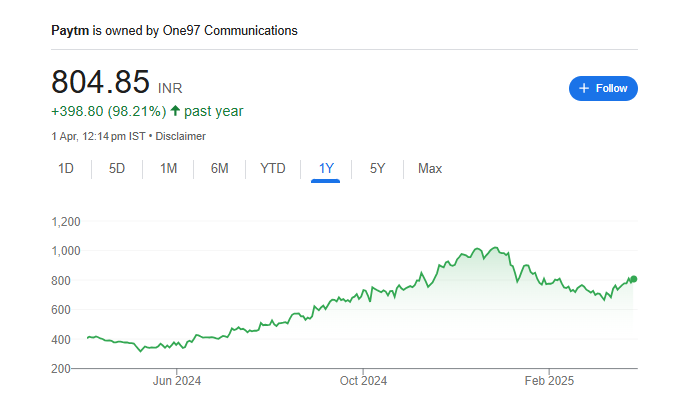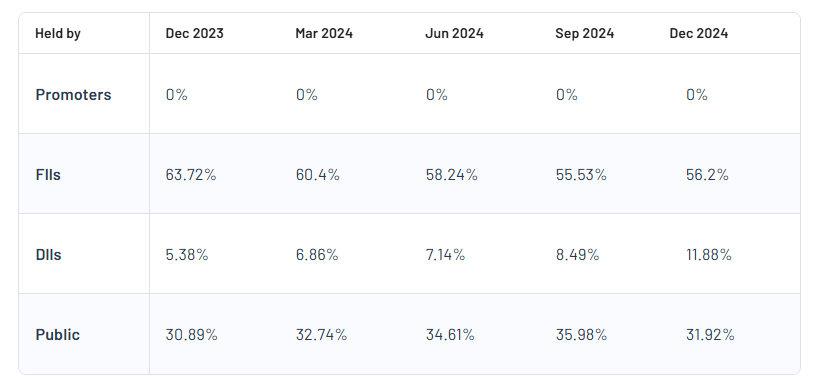Paytm Share Price Target Tomorrow 2025 To 2030
Paytm is one of India’s leading digital payment and fintech companies, offering services like UPI, mobile wallets, and digital lending. Its share price is influenced by factors like user growth, financial performance, regulatory changes, and competition from platforms like Google Pay and PhonePe. While the company is expanding into lending and financial services, concerns about profitability and market competition remain. Paytm Share Price on NSE as of 1 April 2025 is 804.95 INR.
Current Market overview of Paytm Share Price
- Open: 780.00
- High: 805.75
- Low: 772.00
- Previous Close: 783.45
- Volume: 2,630,083
- Value (Lacs): 21,159.02
- VWAP: 788.64
- Mkt Cap (Rs. Cr.): 51,314
- Face Value: 1
- UC Limit: 861.75
- LC Limit: 705.10
- 52 Week High: 1,062.95
- 52 Week Low: 310.00
Paytm Share Price Target Tomorrow 2025 To 2030
| Paytm Share Price Target Years | Paytm Share Price |
| 2025 | INR 1065 |
| 2026 | INR 1500 |
| 2027 | INR 1900 |
| 2028 | INR 2300 |
| 2029 | INR 2700 |
| 2030 | INR 3100 |
Paytm Share Price Chart

Paytm Shareholding Pattern
- Promoter: 0%
- FII: 56.2%
- DII: 11.88%
- Public: 31.92%

Key Factors Affecting Paytm Share Price Growth
-
Revenue Growth & Profitability
Investors closely watch Paytm’s ability to increase revenue and move towards profitability. A strong financial performance, especially a shift from losses to profits, can boost share prices. -
Regulatory Environment
Government policies and RBI regulations on digital payments, lending, and financial services significantly impact Paytm’s operations. Favorable policies can drive growth, while strict regulations may slow it down. -
User Growth & Engagement
Paytm’s large customer base and increasing transaction volume are key factors. More users and higher engagement in payments, loans, and financial services can enhance revenue and improve investor confidence. -
Expansion in Financial Services
Paytm is expanding beyond payments into lending, insurance, and wealth management. Success in these areas can diversify revenue sources and boost long-term growth potential. -
Competition in the Fintech Industry
The presence of strong rivals like Google Pay, PhonePe, and banks offering digital services creates pressure. Paytm’s ability to innovate and retain customers will influence its market position and share price. -
Strategic Partnerships & Investments
Collaborations with banks, NBFCs, and global firms help Paytm expand services. Positive partnerships and fresh investments can strengthen its business model and attract investor interest. -
Global & Economic Factors
Economic conditions, inflation, and investor sentiment in the stock market also affect Paytm’s share price. A stable economy with rising digital transactions can support Paytm’s growth.
Risks and Challenges for Paytm Share Price
-
Regulatory Uncertainty
Paytm operates in a highly regulated industry, and frequent changes in RBI and government policies can impact its business. Restrictions on digital lending, KYC norms, or payments can slow down growth and affect investor confidence. -
Profitability Concerns
Despite strong revenue growth, Paytm is still working towards sustained profitability. High operational costs and intense competition can delay profit generation, making investors cautious. -
Strong Market Competition
Paytm faces tough competition from Google Pay, PhonePe, traditional banks, and newer fintech startups. If competitors offer better services or incentives, Paytm may struggle to retain users and grow its market share. -
Cybersecurity & Data Privacy Risks
As a digital platform, Paytm is vulnerable to cyber threats, fraud, and data breaches. Any security issue can damage its reputation, result in legal penalties, and lead to customer loss. -
Dependence on UPI & Payments Business
A large portion of Paytm’s revenue comes from digital payments, where margins are low. Over-dependence on this segment can limit overall profitability if transaction fees decrease or regulations change. -
Macroeconomic Factors
Inflation, rising interest rates, or economic slowdowns can affect consumer spending and digital transactions. If people reduce online payments or lending slows down, Paytm’s growth could be impacted. -
Stock Market Volatility
Paytm’s stock price has been highly volatile since its IPO. Investor sentiment, global market trends, and any negative news can lead to sharp fluctuations, making it a risky investment.
Read Also:- Super Crop Safe Share Price Target Tomorrow 2025 To 2030







